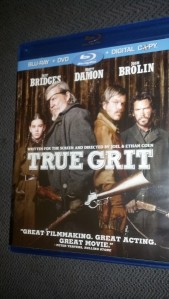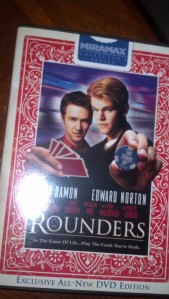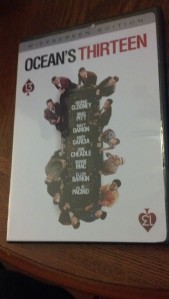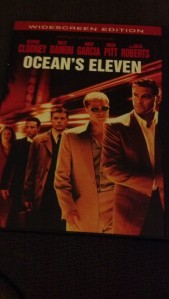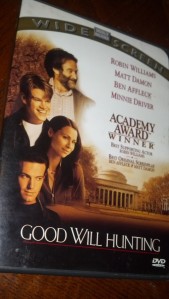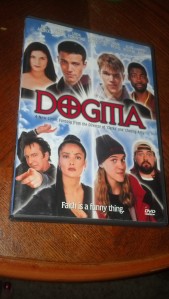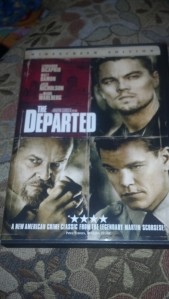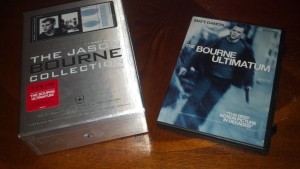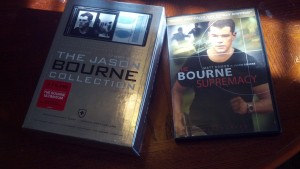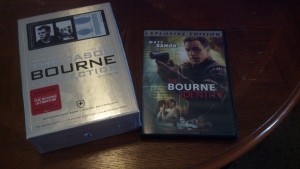The Task: Watch and write about every movie on my shelf, in order (Blu-rays are sorted after DVDs), by June 10, 2015. Remaining movies: 14 Days to go: 12
Movie #426: True Grit
This movie is spectacular. I’ve never seen the John Wayne original, but I can’t imagine it holds a candle to the crisp filmmaking of the Coen Brothers and the sensational performances of Jeff Bridges as Rooster Cogburn, Matt Damon as Mr. LaBoeuf and especially Hailee Steinfeld as Mattie Ross. (I would’ve given her the Oscar for Best Supporting Actress in a heartbeat.)
The story is narrated by the grown Mattie (Elizabeth Marvel), recounting the time when she was fourteen and her father was killed by the villain Tom Chaney (Josh Brolin). He had been away from home on an errand, so Mattie travels to have his body sent back and to capture the criminal herself, since no one else there will care enough to.
The title comes from Mattie’s declaration to Rooster that she has chosen to hire him — a U.S. Marshall — to track down Chaney because she’s heard he has “true grit,” but it’s Mattie who has grit, as she demonstrates over and over. She’s clever, strong-willed and formidable. She has a keen mind for business and law and she takes pains not to trifle with silliness, but she’s not without soul or spirit. She can outsmart a grown man on financial negotiations one minute and cheerily reminisce about the time her father took her on a coon hunt the next. She won’t give up her quest to find Chaney, but that doesn’t mean she doesn’t delight in telling ghost stories around the campfire. She’s resolute, but she is open to new opinions and admits when she’s misjudged people, and she gains the respect of nearly all that she encounters, kind of by the sheer force of her will, including notorious criminal Lucky Ned Pepper (Barry Pepper), who they find Chaney riding with. She feels fear, anger, sadness and deep affection over the course of her journey with the Marshall and the Texas Ranger LaBoeuf and proves herself to be a deep and richly drawn character, who, despite being so young, carries the whole film.
There’s something to be said, too, for the way Rooster and LaBoeuf are also changed by Mattie, both in their relationship with each other and their feelings toward her. They are truly comrades on this quest, working together and coming to respect and appreciate one another in a way only people who have shared a great trial can. All have flaws — and the dialogue snaps with crackling insults and banter as they pick at each other — and all have strengths, and out of these characters flows the story.
I’ve never really considered myself a fan of westerns, but True Grit is the clear exception. The ride is harrowing, the stakes are high, and the action is compelling. Even the largely unlikable broad strokes of the characters (Rooster is gruff, LaBoeuf is arrogant and Mattie herself is stubborn) are made sympathetic by their words and deeds, each one coming to the assistance of the others, and proving there is more to them than their outward appearance. The film is stark and unforgiving, as traditional westerns are, but it is full of heart and courage and perseverance, and I absolutely love it. (I’ve already seen it more times than I can count.)

